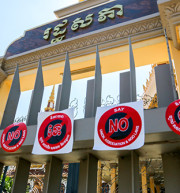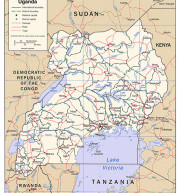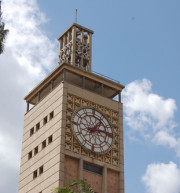
GENEVA – United Nations human rights expert Maina Kiai today called on the Cambodian Senate to reject the draft Law on Associations and Non-Governmental Organisations (LANGO) that “unequivocally threatens the very existence of a free and independent civil society in Cambodia.” The NGO Bill will soon be examined by the Senate, after being approved on Monday 13 July by the Cambodian National Assembly. The Bill was unanimously adopted by the 68 parliamentarians belonging to the ruling party, while the 55 parliamentarians in the opposition boycotted the vote. “Should the draft law be adopted, any group advocating for human rights, basic freedoms and good governance may be shut down and criminalized. It will ultimately have a disastrous impact on Cambodian citizens’ democratic participation in furthering the development of their country,” the Special Rapporteur on the rights to freedom of peaceful assembly and of association warned. “I urge the Senate to reject entirely the Bill as it direly falls short of international human rights norms governing freedom of association, in particular Article 22 of the International Covenant on Civil and Political Rights which Cambodia acceded in 1992,” Mr. Kiai said. The Special Rapporteur highlighted that, under the draft law, associations and NGOs operating without... Continue reading →

GENEVA – United Nations human rights expert Maina Kiai urged Ugandan legislators to hold meaningful consultations with civil society on a Bill that aims at regulating non-governmental organisations (NGO). A one-day consultation is taking place today in Kampala. “Since the Government of Uganda intends to regulate the framework governing associations, the ostensible beneficiaries of the law should be key partners of the drafting process,” Mr. Kiai said, expressing serious concern that the NGO Bill may not reflect the views of the various interested parties engaged with the consultation process. “I call on the legislators to allow more time for consultation so that all stakeholders have an opportunity to contribute to this important discussion. A day is simply not enough for discussing these weighty issues,” the UN Special Rapporteur on the rights to freedom of peaceful assembly and of association said. The NGO Bill introduced in May and due to be debated in the coming months, seeks to repeal and replace the current Non-Governmental Organisation Registration Act Cap 113 regulating NGO activities in Uganda. “I am concerned about a number of provisions contained therein that severely restrict the right to freedom of association,” the human rights expert stated. “The vague formulation of such provisions... Continue reading →
GENEVA – United Nations human rights expert Maina Kiai today reiterated his call to the Government of Cambodia to ensure that civil society can meaningfully contribute to the elaboration of the draft Law on Associations and Non-Governmental Organizations (LANGO), which is expected to be adopted by parliament this month. “It is ironic that the drafting of a law regulating civil society in Cambodia excludes civil society from the process,” the UN Special Rapporteur on the rights to freedom of peaceful assembly and of association said, stating that he has “serious concerns about a process that would result in the adoption of the LANGO without meaningful public participation.” Mr. Kiai noted that the development of legislation to regulate civil society associations in the country, which dates back to 2008, has been reportedly shrouded in secrecy. “Relevant stakeholders have told me that the content of the current draft law has not been disclosed and they have been unsuccessful in their attempts to acquire a copy of text,” he said. “Sidestepping the democratic process by leaving out civil society actors and their important contribution from the process, and avoiding international scrutiny of legislation, is not without precedent in Cambodia,” he said, noting that important electoral laws and laws on the... Continue reading →
NAIROBI/SUCRE, Bolivia - Special Rapporteur Maina Kiai has filed an amicus curiae brief in the Constitutional Court of Bolivia, arguing that a national law and an executive decree regulating the operations of non-governmental organizations breach the international right to freedom of association. The brief, which was submitted on May 13, 2015, was the first official court filing in the UN expert’s project to advance the rights to freedom of peaceful assembly and of association through the use of litigation in national and regional courts. The project began in Oct. 2014 and aims to encourage the application of international law norms at the domestic level. In March 2013, Bolivia adopted the controversial law on legal personality, despite many analyses indicating that it contravened international law. In June 2013, the equally contentious implementing Supreme Decree followed. Late last year, the “Defensor del Pueblo” filed a petition with the Constitutional Court of Bolivia (Tribunal Constitucional Plurinacional de Bolivia), to challenge two specific provisions it deems unconstitutional. In the analysis of the Special Rapporteur these provisions indeed “unjustifiably restrict the right to freedom of association under international law, standards and principles”. The first challenged provision, Art 7. II. 1 of... Continue reading →
GENEVA – Three United Nations Special Rapporteurs today warned that the NGO Bill currently discussed by Parliament in South Sudan threatens the work and independence of civil society organizations in the country. “The Government oversight proposed in the draft law goes beyond simple notification requirements and veers into the territory of excessive control,” they stressed. “We urge the Government of South Sudan to reject legislation that would unduly restrict the sectors in which associations can work and narrowly defines permissible objectives for these associations, severely limiting the independence of such groups,” they said. The human rights experts reiterated their serious concern about the growing trend in Africa and elsewhere to wield more governmental control over independent groups using so-called ‘NGO laws’. “South Sudan’s NGO Bill is yet further evidence of a worrying tendency worldwide,” they noted. The NGO Bill also includes burdensome registration and re-registration requirements and criminal penalties for non-compliance with the proposed law. “The ability of civil society organizations to engage in activities of their own choosing is fundamental to the right to freedom of association,” the Special Rapporteur on the rights to freedom of peaceful assembly and of association,... Continue reading →

GENEVA – A group of United Nations Special Rapporteurs today urged the Government of Kenya to reject legislation that would impose severe restrictions on civil society. “The Bill is an evidence of a growing trend in Africa and elsewhere, whereby governments are trying to exert more control over independent groups using so-called ‘NGO laws,’” the human rights experts warned. The Bill, which was presented to Parliament on 30 October, would amend Kenya’s Public Benefit Organization Act of 2012 and grant the Government sweeping and potentially arbitrary powers to deny registration for such organizations, including NGOs. It would also cap foreign funding at 15% of their total budgets and channel all their funding through a government body, rather than going directly to beneficiary organizations. “The amendments to the regulations of associations contained in the draft law could have profound consequences for civil society organizations in Kenya, including for those involved in human rights work, and could deter individuals from expressing dissenting views,” the UN Special Rapporteur on the situation of human rights defenders, Margaret Sekaggya, stressed. The expert called on the Kenyan authorities to immediately suspend the legislative process of the Bill, and to re-evaluate it in line with international... Continue reading →
Blantyre, Malawi – Maina Kiai told a conference of civil society leaders in Malawi today that African civil society is “under attack” from all angles and facing a crisis of shrinking space, as underscored by recent developments in Kenya and South Sudan. “Governments across the region are moving rapidly to squeeze civil society out of its rightful place in the public sphere,” Kiai said after the speech. “They see civil society as a competitor, challenging their authority. And they are attacking from all angles – cutting off their ability to seek funds, imposing improper registration requirements, and harassing people who speak out.” Kiai, the United Nations’ Special Rapporteur on the freedoms of peaceful assembly and of association, spoke of the attacks during a keynote address on the first day of the ACT Alliance regional consultation on civil society space in Blantyre. The consultation was convened to explore ways that civil society groups in the region can ensure their ability to operate in a so-called “enabling environment.” Such an environment includes a functioning democratic judicial system, vibrant freedoms of expression, assembly and association, and the ability to secure funding and participate in public affairs. Kiai pointed to numerous examples of shrinking civil society space,... Continue reading →
The rights to freedom of peaceful assembly and of association are enshrined in a number of international and regional human rights instruments, from the Universal Declaration of Human Rights (Article 20(1)) to the International Covenant on Civil and Political Rights (Articles 21 and 22). Similar protections exist in a number of regional human rights instruments as well, including the African Charter on Human and Peoples’ Rights (Articles 10 and 11), the American Convention on Human Rights (Article 11), and the Charter of Fundamental Rights of the European Union (Article 12). A list of International and regional references can be found here. Or, check out the Special Rapporteur's factsheet series, which summarizes key aspects of the rights to freedom of peaceful assembly and of association in an easy-to-use question/answer format. Best practices As part of his first report to the Human Rights Council in 2012, Special Rapporteur Maina Kiai highlighted “best practices" for the promotion and protection of the rights to freedom of peaceful assembly and of association. These best practices cover not only what is required by international human rights law, but also include principles that go beyond these legally binding obligations (A/HRC/16/51, para. 10). They make reference to legal and institutional frameworks and are... Continue reading →
Maina Kiai and two other United Nations independent human rights experts today expressed serious concern at the “obstructive, intimidating and stigmatizing effects” brought about by the current implementation in the Russian Federation of the law on ‘non-commercial organizations’ (NCOs), adopted on 21 November 2012 by the Duma. The UN Special Rapporteurs on freedom of association, human rights defenders and freedom of expression urged the Russian authorities to revise the law due to its lack of compliance with international law and standards and its adverse consequences on the important work of hundreds of organizations and human rights defenders. “Unfortunately, our fears seem to have been confirmed,” said the Special Rapporteur on the rights to peaceful assembly and of association, Maina Kiai. In July 2012, the three experts warned that the law could brand as ‘foreign agents’ all foreign-funded NCOs engaging in political activities and impose severe penalties for non-compliance with the established requirements. They also raised alarm about the use of the term ‘foreign agents’, which can be associated with ‘spy’ and lead to increased stigmatization and vulnerability to acts of violence against those targeted. “Since the law was passed, we now witness an unprecedented wave of inspections... Continue reading →
A group of United Nations independent human rights experts today urged the Egyptian Shura Council not to adopt a draft law on civil society organisations, which, in its current form, does not comply with international human rights norms and standards relating to freedom of association. “It is highly regrettable that a government that was formed as a response to peaceful social activism can place such restrictions on people’s right to freedom of association,” said the UN Special Rapporteurs on freedom of peaceful assembly and of association, on human rights defenders, and on freedom of opinion and expression. “All actors should play a role in the conduct of public affairs.” The human rights experts regretted that valuable recommendations put forward by Egyptian civil society actors were not taken into account in the drafting of the text. “We are seriously concerned that numerous provisions contained in the draft law may be used to hamper the legitimate work of civil society organisations, particularly those advocating human rights,” they noted. The experts welcomed the Egyptian authorities’ initiative to revise law 84/2002 due to its lack of compliance with international standards; however, they warned that “the draft legislation currently being considered by the Shura Council has a number of serious... Continue reading →